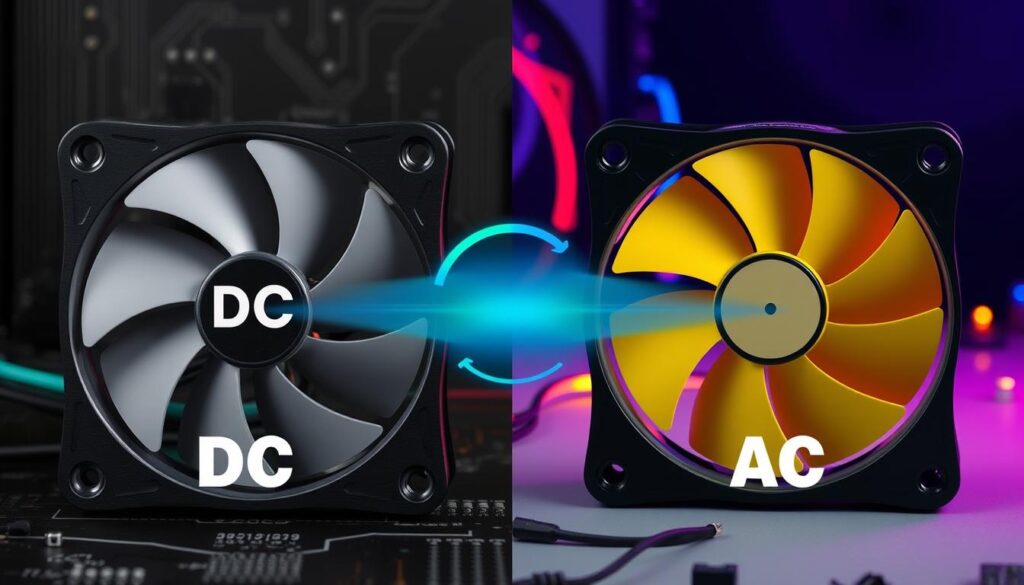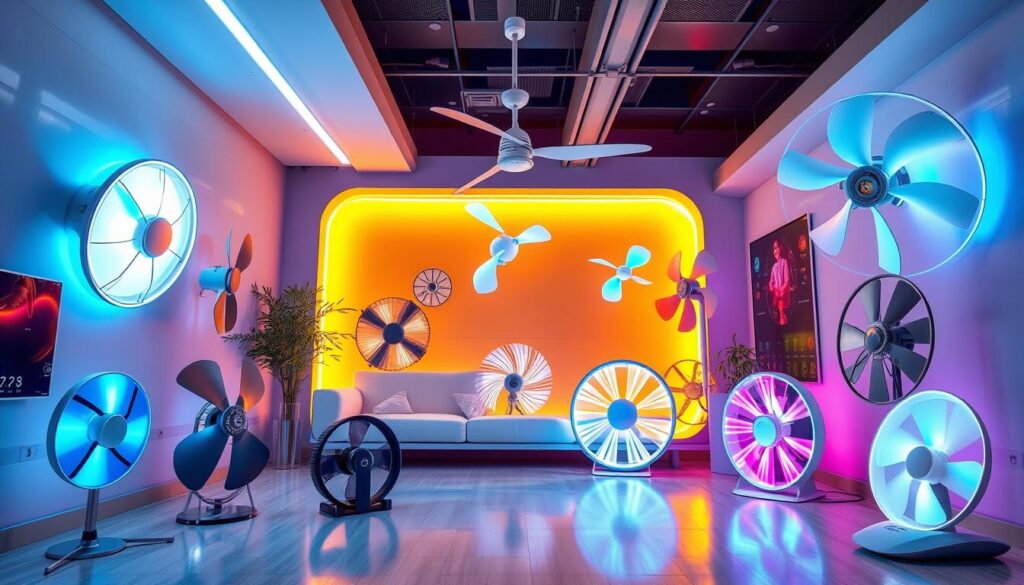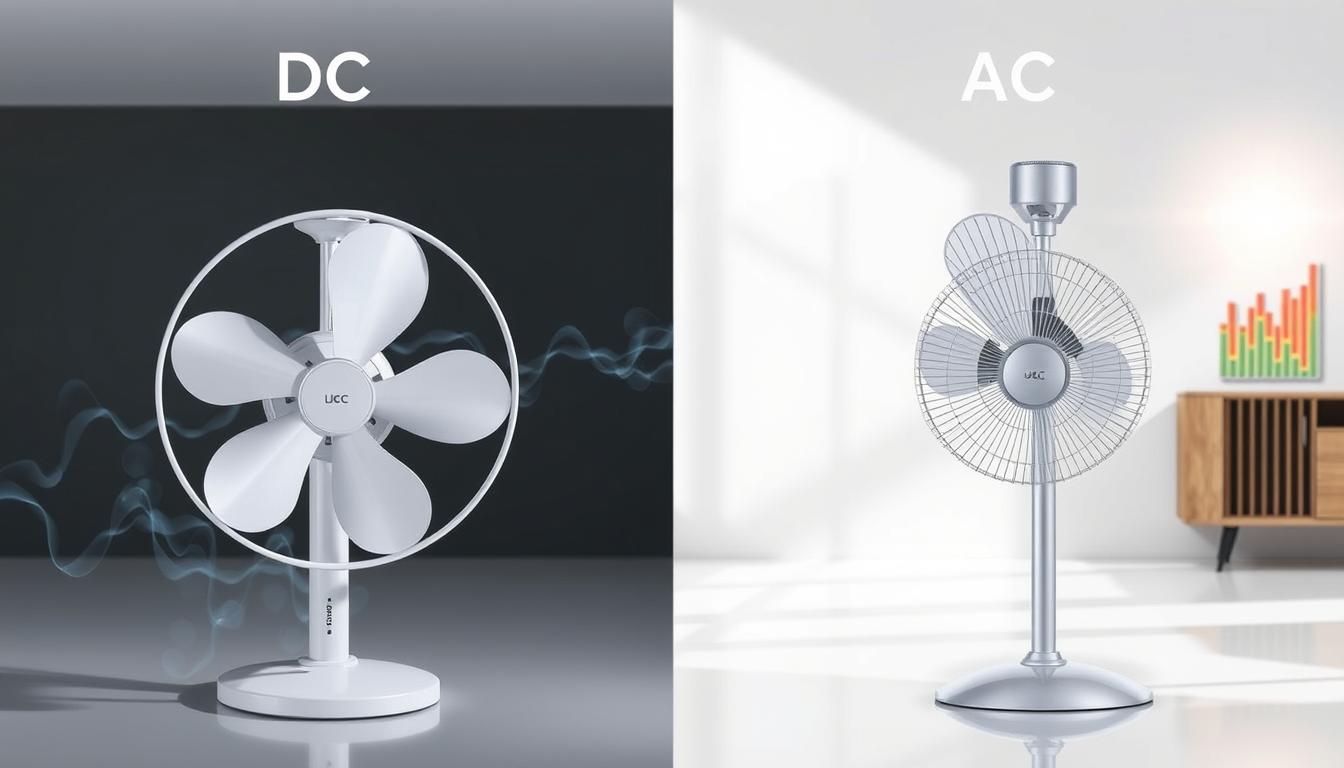Technology keeps getting better, making the choice between DC and AC fans widen each day of its release, this article will discuss how the two fans use their energy. The focal points will be on their power usage, cost saving and their performance. This will help you make a wise choice for your fans.
Key Takeaways
- Low-pressure DC fans consume up to 30 per cent less electrical power than their AC counterparts. DC fans tend to be more efficient than AC fans in general.
- A DC fan will last longer, and in general require less maintenance than an AC fan.
- Although a DC fan incurs a higher initial cost, total energy expenditures over the fan’s life time can be less.
- Factors like fan size, motor efficiency, and usage patterns can significantly impact the power consumption of both DC and AC fans.
- Making the correct fan selection will result in both energy savings on your energy bill as well as a reduced environmental footprint.
Understanding the Fundamentals of DC and AC Fans
How much power is used by DC and AC fans? Knowing the way both DC and AC fans work will help us find the answer. DC fans use direct current, while AC fans use alternating current.
How DC Fans Work
DC fans use direct current to spin. They have a part called a commutator that switches the current flow. This lets DC fans run at many speeds, saving energy.
How AC Fans Work
However, AC fans use electrical current that alternates (called alternating current, or simply AC). AC fans have a relatively simple type of motor that spins as the voltage reverses and switches directions. An AC fan is less stepless than a DC fan but much cheaper to make.
We can now learn how both fans, DC and AC, work, and how much energy is being used by the fan in their specific applications. This is helpful to know the best and most energy-efficient fan to use.
“The choice between DC and AC fans is not just about power consumption; it’s about understanding the unique characteristics and capabilities of each technology.”
Energy Efficiency: DC Fans vs AC Fans
The debate of dc fan vs ac fan indicates that dc fans has advantages on energy saving over ac. The main reason is technical differences between dc and ac fan.
Dc fan uses fewer energy than AC. The main difference between these two types are diode bridge transformers.Inside the part of dc fan that blows the air flow has less power convertors to turn to voltage, AC fan requires needless current to control voltage on the other part. Overall, dc fan is more energy efficient.
Unlike small fans using AC current, DC fans have brushless, permanent magnet motors that are significantly more efficient than the induction motors used on the AC fans. So, not only can the blower reduce the need for AC, but the DC fans themselves use much less power.
- DC fans can boost their efficiency to 90 per cent, whereas AC fans can manage only 60-70 per cent.
- The DC fans also have advanced control systems that helps in managing energy to utilise less power.
So, why are dc fans better than ac fans? DC fans can run at many speeds without losing much efficiency. On the other hand, ac vs. dc ceiling fans often lose efficiency at lower speeds, using more power.
“DC fans can be up to 30% more energy-efficient than their AC counterparts, resulting in significant long-term cost savings for consumers and businesses.”
As they are more energy efficient than the ac ceiling fans, dc ceiling fans vs ac are gaining popularity nowadays among any homes or businesses that want to cuts costs and contribute to environment.
dc fan vs ac fan power consumption
Factors Affecting Power Consumption
There are some main differences between DC and AC fans. First, let’s look at their shapes. DC fans are a bit squarer than AC fans. Secondly, the price range is different. AC fans tend to be cheaper than DC fans. Thirdly, AC fans are more convenience than DC fans. AC fans can be controlled while connected to a power source. In contrast, DC fans don’t have this function.
In conclusion, there are some differences between DC and AC fans. Whether you should choose AC or DC fan depends on the user’s needs and uses.
The low power usage of these DC fans is further enhanced by high motor efficiency. DC fans, using direct current, yield more efficient motors than AC fans (using alternating current).
Also, the speed of operation is more easily controlled. The speed of DC fans can be controlled more accurately. In this way, you can save energy by using the fan at the optimal speed.
The handling of changing loads is another point. DC fans show good performance and more efficiency in terms of power usage, when the loads vary. On the other hand, AC fans perform well only when the applicational loads do not change. When the loads do change, AC fans use extra power to be consistent.
| Factor | DC Fan | AC Fan |
|---|---|---|
| Motor Efficiency | Higher | Lower |
| Speed Control | Precise | Less Precise |
| Load Variations | Maintains Efficiency | Reduced Efficiency |
Understanding these factors helps you decide between a DC fan and an AC fan. It’s about finding the best fit for your power needs and energy goals.
Comparing the Energy Costs of DC and AC Fans
With the DC and AC ceiling fans that are currently on the market, the cost considering can save you lots of money in the long run. The table below shows you some costs to help you visualize about the money you could be saving if you purchase a DC fan VS AC fan. Considering the cost, DC will ultimately save you an extra $140.00 dollars per year.
Cost Analysis and Calculations
DC fans use 30-50% less power than AC fans. This means they can save you money on your energy bills.
Let’s say you use a ceiling fan for 8 hours a day. If electricity costs $0.12 per kWh, an AC fan uses 75 watts. That’s about $70.56 a year. But a DC fan uses 35 watts, saving you over $37 a year.
| Fan Type | Power Consumption | Annual Energy Cost (8 hrs/day, $0.12/kWh) |
|---|---|---|
| AC Fan | 75 watts | $70.56 |
| DC Fan | 35 watts | $32.76 |
These savings can really add up over time. So, choosing a DC fan is a smart choice for both homes and businesses.

When deciding between dc ceiling fans vs ac, think about the energy costs. This helps you choose the most cost-effective and eco-friendly option for your space.
Environmental Impact: Which Fan Type is Greener?
Choosing between dc fan vs ac fan power consumption is important for the environment. Both DC and AC fans affect sustainability and carbon footprint differently.
DC ceiling fans vs ac show a big difference in energy use. DC fans use up to 30% less energy than AC fans. This leads to less greenhouse gas emissions and a smaller carbon footprint. So, DC fans are better for the planet, especially where fossil fuels are still used for electricity.
| Environmental Factors | DC Fans | AC Fans |
|---|---|---|
| Energy Consumption | Lower | Higher |
| Carbon Footprint | Smaller | Larger |
| Disposal and Recycling | More Eco-friendly | Less Eco-friendly |
Also, think about how they’re made and thrown away. DC fans are made with eco-friendly materials and can be recycled. This makes them better for reducing waste and saving resources. On the other hand, ac vs. dc ceiling fans might be harder to recycle and dispose of properly.
In conclusion, picking between dc fan vs ac fan power consumption should look at both cost savings and environmental impact. DC fans are the greener choice, offering a sustainable cooling solution.
Choosing the Right Fan for Your Needs
It is a task to make a choice between a AC and a DC fan for your home or business, depending on energy use of these fans. The electrical bills and the surrounding of the environment are also deeply affected by the choice of a particular type of fan that is either AC or DC fan. Whether you decide on a dc fan vs ac fan power consumption, there is a need to think about what is your priority depending on the environment you want to place the fan.
Considerations for Residential and Commercial Use
In homes, consider room size, how you use the space, and where you can install the fan. DC ceiling fans vs ac have different perks. DC fans are quieter and use less energy, great for quiet areas. AC fans might be better for big rooms needing more air.
In businesses, the choice between ac vs. dc ceiling fans depends on how long you’re open and how many people are there. If you’re open all day or have lots of people, dc ceiling fans vs ac could save energy and work well.
| Residential Considerations | Commercial Considerations |
|---|---|
|
|
The right ceiling fan for you depends on your specific needs. Think about power use, energy saving, and how easy it is to install. This way, you’ll find a fan that’s comfortable, saves money, and is good for the planet.
Innovative Technologies in Fan Design
New features and designs constantly emerge in the world of fan technology. Manufacturers are adding features such as smart controls and brushless motors that help make fans cool better.
One of the most highly touted features of fans nowadays are ‘smart controls’ that let you control the fan speed and fan temperature from your phone or through voice commands, making everything much more convenient and also saving energy for your pocket.
Brushless motors are the other. They are smaller, more efficient and longer lived than the older AC fan motors. So, why are dc fans better than ac fans? Because the technology makes fans quieter and less power hungry.
Improving air movement is also a priority. Computer simulations and wind tunnels are used to design fans better, which results in improved air flow and quieter fans.

Conclusion
The choice between DC fans and AC fans depends on energy efficiency, cost, and performance. DC fans save more energy and are quieter. But AC fans are still popular because they’re easy to find and well-known.
DC fans use up to 30-50% less energy than AC fans. This means big savings on your bills over time. So, DC fans are great for saving money and the environment.
But, think about installation, upkeep, and how they fit with your home’s wiring. DC fans might need special wiring but offer more customization and smart home features. The best fan for you depends on your needs, budget, and what you like.
FAQ
What is the difference between AC and DC fans?
AC fans run on alternating current, while DC fans use direct current. This difference affects their energy use, motor design, and control. AC fans and DC fans work differently.
Why are DC fans better than AC fans?
DC fans are more energy-efficient than AC fans. They use less power but move air just as well. This makes them a better choice for saving energy.
How can I tell if a ceiling fan is AC or DC?
To find out if a ceiling fan is AC or DC, check a few things:
1. Look at the product specs or manual. It should say the fan type.
2. Check the power cord. AC fans have a 3-prong plug, while DC fans might have a 2-prong or adapter.
3. Inspect the motor. DC fans have a sleeker motor than AC fans.
Which ceiling fan is better, AC or DC?
DC ceiling fans are better than AC ones. They use less energy and move air better. DC fans also offer better speed control.
How does the power consumption of DC and AC fans compare?
DC fans use up to 30-50% less power than AC fans. They move air as well or better. This means big savings on energy costs over time.
Which fan type is better for the environment?
DC fans are better for the environment. They use less electricity, which means less carbon emissions. This makes DC fans more eco-friendly than AC fans.
When should I choose a DC fan over an AC fan?
Choose DC fans for most situations, especially where saving energy matters. They’re great for big spaces and places with lots of use. DC fans help save energy and move air well.
